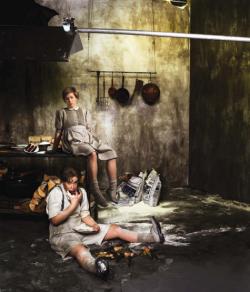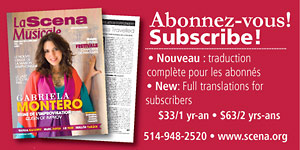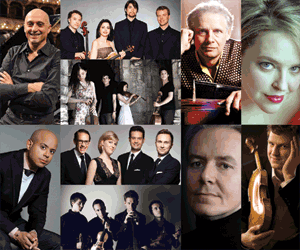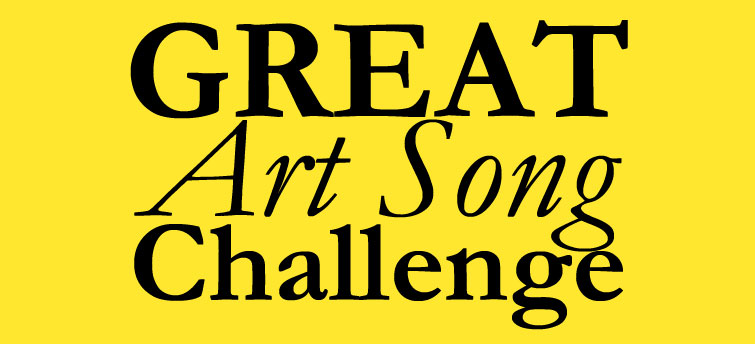Met at the Movies: Hansel and Gretel
 The second installment of the current Met in HD arrived on New Year's Day. It happened to coincide with a fierce snowstorm that descended on Toronto just hours earlier. But you would never have guessed looking at the huge turnout at the Sheppard Grande in Toronto. Perhaps there was one surprise - the audience demographics remained as superannuated as ever. I spotted all of six children the whole afternoon! Despite the bad weather that can sometimes affect reception, the performance in Cinema Three went smoothly. There was only, literally, a split-second loss of sound, which the theatre manager assured me was the fault of the Met. He also said he personally went up to the theatre roof before the show to make sure the satellite dish was free of snow...
The second installment of the current Met in HD arrived on New Year's Day. It happened to coincide with a fierce snowstorm that descended on Toronto just hours earlier. But you would never have guessed looking at the huge turnout at the Sheppard Grande in Toronto. Perhaps there was one surprise - the audience demographics remained as superannuated as ever. I spotted all of six children the whole afternoon! Despite the bad weather that can sometimes affect reception, the performance in Cinema Three went smoothly. There was only, literally, a split-second loss of sound, which the theatre manager assured me was the fault of the Met. He also said he personally went up to the theatre roof before the show to make sure the satellite dish was free of snow...Unlike Toronto, the Met performance was teeming with kids. Afterall, this was a special performance put on for the telecast, and at an hour suitable for youngsters. Holiday Season at the Met usually brings lighter fare, such as the fabulously entertaining Julie Taymor production of Magic Flute last year. But one can hardly call this Richard Jones/John Macfarlane production from Welsh National Opera "light fare", or frankly, even "entertaining". This very production was telecast in the UK several years ago and I managed to see it. So this time around, it came as no surprise to me, although I must say I was once again struck by Richard Jones' singularly dark vision. It seems that under the fanciful patina of many a Grimm's tale lurks a cruel and gritty heart. Germanic children stories have a knack of scaring the bejesus out of their target readers. OK, perhaps these fairytale operas are meant for adults, not kids. (If you are familiar with the other Humperdinck opera, Koenigskinder, I think you'll agree with me) Rather than downplaying the darker side of human nature, the Jones production puts it front and centre.
If Met audiences were expecting grandly colourful sets with flying angels, gingerbread houses, dew fairy with her magic wand, a jolly sandman, and a rousing ride by the witch on her broomstick, they were sure to be disappointed. Given the central theme of this production is hunger and its aftermaths, one can sort of understand the perverse decision of setting the three acts in three different kitchens. Act One is set in the traditional kitchen of the family - no problem there. Act Three is in the witch's kitchen. There's no forest in the problematic Act Two, just a kitchen cum dining room, with Hansel and Gretel resorting to sleeping on the floor. The fourteen angels are obese chefs, cooking up delicacies in the chidren's dreams. The only suggestion of forest is the leafy wallpaper and the humanoid-trees. The colour scheme of the whole production, with the exception of a few splashes of colour here and there, is unappealingly monochromatic. Originally designed for the WNO with its smaller stage, this production is much too small for the Met stage, and dare I say unworthy of the Met. It also singularly lacks magic - where is the technical wizardry that we know the Met is capable of? If any opera needs the illusion of magic, it would be this one.
At least the proceedings were partially redeemed by a good cast. The Witch, an unrecognizable Philip Langridge inside an enormous bodysuit, could have been a sister of Mrs. Doubtfire. This Witch didn't have a nasty bone in her body - she kept smiling, even inside the oven. One almost feel sorry for her! Former soprano Rosalind Plowright, as a suicidal Gertrude, was more unsympathetic than usual. She also sang with acid tone and strident top notes. Alan Held was a jolly and vocally sonorous Father. As the children, soprano Christine Schaefer and mezzo Alice Coote both sounded fresh, although Schaefer does not have an especially sweet sound. They also played their parts to the hilt, just right for the 3800-seat Met theatre, but over-the-top given the numerous television close-ups. The new English translation by David Pountney was colloquial and approachable, although much of the words didn't come through, especially in the high voices. Despite the sinister and decidedly un-Romantic goings-on on the stage, conductor Vladimir Jurowski brought out the full measure of lyricism of the score from the wonderful Met orchestra. The intermission features with Joe Clark was interesting, although I must say I am getting a little tired of the overly cheerful and solicitous Renee Fleming as the intermission host.
Final thoughts? I'd loathe to take a child to this show as his/her first Hansel and Gretel. It will likely give a young person a distorted view of this opera, not to speak of a jaundiced view of human nature in general. At the risk of sounding didactic about all this, as I see it fairytales function to entertain, but also to elucidate, to educate the young, to teach them right from wong. Which culture advocates cannibalism, even as revenge? The darkness that pervades in this H&G, justified as a reflection of "reality" or modern-day sensibilities (as suggested by Christine Schaefer in the intermission interview) is a sad commentary on contemporary society. Children grow up fast enough, why expose them to the ugliness of adults before their time? Those who enjoy opera directors updating and deconstructing works of the past at any cost may like this show. But to me this is a particularly mean-spirited attempt at an "update". I think I have had my fill of Richard Jones' vision.
Joseph So
Labels: HD, Metropolitan Opera













1 Comments:
As a first-time reader of your column, I already believe that you and I have wildly differing opinions and I will probably attend or avoid the opposite of what you say. Perhaps this first reading is an anomaly and I look forward to reading more of what you have to say in the future.
Richard Jones’s production of Hansel and Gretel is a far more entertaining production than the cookie cutter identical holiday types of shows routinely trotted out by theatres world-wide year after yearof. For example, let’s take, The Nutcracker -- where, the tradition seems to be to slavishly put on stage productions that appear to give little thought to any more than direct representation and an emphasis on the simplest themes and meanings of the work. An antidote to this syndrome in the Nutcracker world is Mark Morris's "The Hard Nut" which, if it has not already, will hopefully make it to Toronto some day.
This Hansel and Gretel, like the Hard Nut, attempts some changes from the museum production method. He replaced the trite flying angels and witches you seem to yearn for based on previous viewings of the same. He tried something new and equally magical in its own way. An emphasis on deeper true humanity via the idea of hunger and what it makes the characters do is a breath of gingerbread air. Hunger. The mother’s (happy for less than a pound of tea and a wurst), the children’s (yearning for foods they rarely get – pudding, strudel, berries they eat themselves depriving their parents with the fake excuse of a bird), the father (hungry for a little action, which seems more likely when the mother’s hunger has satisfied by a good meal she was not expecting – after being on the edge of suicide), the witch (hungry for a some temporary pre-meal companionship and a little fattened gingerbread hand), who gives a nod to her flying broom but uses it as a spit on which to fatten hungry Hansel.
The witch, as in most written and produced versions of Hansel and Gretel, is scary. Albeit in a “that scary lady or man down the block who wants you to sit with her and her cats and eat stale candy when you want to be out playing” sort of way. How often is a Grimm fairytale ever “light fare” and “entertaining”? As a spectacle, many of us do hope for entertainment (especially at $20 not cheap, but seemingly so compared to COC’s cheapest $90 live opera price). Is there anything darker than a mother who sends her children to the woods at night or a witch who bakes children into edibles? This is inherent in the tale. Why should Mr. Jones downplay the darker side of human nature and why aren’t you celebrating him for putting it front and center? It being artfully emphasized is what makes his production interesting. While the final cannibalistic moment was very “The Cook, The Thief, His Wife and His Lover” it was made lighter and happier than that film’s final moment by the chorus of happily freed children hungrily wielding and playing their utensils like percussion instruments.
Do all theatrical representations of a forest have to be a naturalistic looking bunch of trees? Does one need more than leaves and giant men tree trunks to evoke a forest? The continuing theme of the kitchen, a place where hunger should be sated gives us a bit more to think about that you seem to appreciate would go out the window if not carried through here, including not only a cooker and a sink, but a procession of fantastic chefs. The dew fairy did have a magic wand, the cooking implement she was washing in the sudsy sink (as did the witch later with her cooking spoon). The washerwoman fairy was magical and witty all in itself (as well as beautifully sung).
While children in the audience (and many adults) may have had difficulty understanding the sung words due to lack of enunciation, those who read the subtitles or did know the work from previous incarnations were able to see how witty, different and a step beyond the dull and the ordinary the chef dream ballet and the cake toungue/mouth drop really were. A gaping maw (echoing the earlier Francis Bacon-like mouth inter-act drop that was seen for a disappointingly sad length of time in the high definition transmission) with a cake filled tongue in it is much more imaginative and frightening than a “traditional” pretty gingerbread house. The image was worthy of Gretel's mistrust and fear that what she sees is a trap as opposed to a friendly gingerbread house that no child would think twice about before nibbling upon like a greedy mousie. These are hungry children who have been out all night without supper, but they risked gorging on a cake with the artfully obvious a risk of being eaten themselves.
If anything, I found it disappointing that the Metropolitan Opera showed pictures of these various scenes prior to the show removing some of the surprise of the discovery as the transmission of the production unfolded.
Is your publication dedicated to the promotion of music and the arts or to the stagnation and museum preservation of such works?
Based on your writings, I am surprised that you were surprised by the older-skewed age of the audience -- those who feel comfortable with the traditional production they may have been expecting. Not the Sponge Bob crazy, scare-my-pants-off wild children of today. I am pleased that most of the folks I sat with at the Scotia Bank Theatre performance (one of two full theatres at that complex) seemed genuinely entertained and pleased by Mr. Jones’s work as evidenced by the discussions I overheard on the way out.
As all of this is new to me as a recent Toronto resident, I hope to find that many Torontonians are open to the exciting and the new. I will continue to read your work and that of your publication looking for just such things.
Thank you for making me think deeper about the production.
By Thomas, At
January 3, 2008 1:54 PM
Thomas, At
January 3, 2008 1:54 PM
Post a Comment
<$I18N$LinksToThisPost>:
Create a Link
<< Home